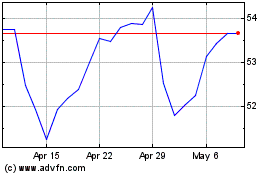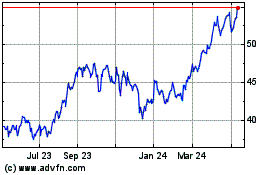Canada Issues Split Decision on Oil Pipelines
November 29 2016 - 5:50PM
Dow Jones News
Canadian Prime Minister Justin Trudeau turned down a proposed
Enbridge Inc. pipeline to the West Coast that had become a
flashpoint for protesters, while approving a less controversial
expansion of an existing Kinder Morgan Inc. corridor that will
offer landlocked oil sands producers access to tidewater.
Mr. Trudeau rejected Enbridge's yearslong attempt to build the
Northern Gateway pipeline, which would have carried 525,000 barrels
a day of crude oil along 730 miles to the port at Kitimat, British
Columbia. The project was widely supported by Canadian oil sands
producers, whose only significant export market is the U.S., but
faced the kind of fierce opposition from aboriginal and
environmental groups that has mounted across North America in
recent years.
But the prime minister approved Kinder Morgan's proposed
expansion of its Trans Mountain pipeline, which will nearly triple
the capacity of an existing pipeline to 890,000 barrels of crude a
day at a cost of 5.5 billion Canadian dollars ($4.1 billion).
The project would increase Canadian crude exports to Asia and
reduce its dependence on the U.S. market where Canada's oil sells
at a substantial discount to global prices. Kinder plans to
increase ship loads of crude oil to foreign markets, including
China, to 34 ships a month from five now.
The pipeline decisions point to a careful balancing act on
energy by the Trudeau government, which has announced plans to levy
a nationwide carbon tax that could make it a leader in the global
battle against climate change and has pledged to phase out
coal-fired power.
But Canada's economy remains dependent on natural resources, and
while he repeated his commitment to fighting climate change in
announcing the pipelines Tuesday, Mr. Trudeau said that making a
transition away from a fossil fuel economy won't happen overnight.
Instead, he said, Canada needs to work on that transition, while
still seeking to tap new markets for its energy exports.
"There isn't a country in the world that would find billions of
barrels of oil and just leave it in the ground while there is a
market for it," Mr. Trudeau said at a press conference.
A cap on greenhouse gas emissions announced by the province of
Alberta will place some limits on oil sands development, he said,
and the pipelines won't change that.
The government approved Enbridge's proposed Line 3 project,
which aims to replace segments of an existing pipeline connecting
Hardisty, Alberta, to Wisconsin. The project has a price tag of
C$7.5 billion.
A representative Kinder Morgan wasn't immediately available for
comment.
Calgary, Alberta-based Enbridge said it would assess its options
for the rejected Northern Gateway pipeline. Meanwhile, the Line 3
approval should allow it to start work in 2019, two years later
than it had originally planned. "This approval today is an
important milestone and brings us one step closer to making this
important project a reality," a company spokesman said.
Canada's largest oil producer, Suncor Energy Inc., said it was
pleased with the decision on pipeline expansion and disappointed by
the decision to reject the third proposal. "Projects such as
Northern Gateway, which allows for Canadian resources to access
global markets, are a good thing not only for crude producers and
marketers, but also the Canadian economy," the Calgary-based
company said in a statement.
The approval of Trans Mountain, along with an earlier decision
this fall to green light a natural gas plant in British Columbia,
could go some way to allaying concerns in the energy patch that the
Liberal government's climate policy will make it harder to get
projects approved.
But the incoming U.S. administration of President-elect Donald
Trump could complicate the Trudeau government's efforts to balance
its environmental agenda with the building of pipelines.
Mr. Trudeau didn't directly answer a question at the press
conference about whether he would talk to Mr. Trump about reviving
the Keystone XL project. Mr. Trump has signaled support for the
project, which Canada already has approved but which needs a U.S.
presidential permit to move forward. Approval for Keystone XL would
further ease the bottleneck on Alberta's landlocked oil sands, but
could create a political problem for Mr. Trudeau in his quest to
reduce carbon emissions.
Limited access to global markets for Canada's crude oil has hurt
the industry for years, contributing to Canada's oil trading at a
discount. Better market access would result in lower transportation
costs and could be an incentive to boost oil sands output at a time
when the oil sands' production growth is being crimped by high
extraction costs and concerns about its higher greenhouse gas
emissions.
Enbridge's proposed Gateway corridor had faced the fierce
opposition, generating debate akin to the fight over Keystone XL in
the U.S.
The TransMountain project wasn't expected to generate as much
controversy because it follows an existing crude oil pipe that has
been shipping oil from northern Alberta to the coast of British
Columbia for decades.
But the proposal in 2013 to complete that "twinning" of the line
to the coast of British Columbia set off a firestorm of protest,
primarily in Vancouver, a birthplace of the modern environmental
movement. The most contentious part is the last mile, which runs
through a wealthy and leafy suburban area at the base of Burnaby
Mountain.
Write to Paul Vieira at paul.vieira@wsj.com and Chester Dawson
at chester.dawson@wsj.com
(END) Dow Jones Newswires
November 29, 2016 18:35 ET (23:35 GMT)
Copyright (c) 2016 Dow Jones & Company, Inc.
Suncor Energy (TSX:SU)
Historical Stock Chart
From Mar 2024 to Apr 2024

Suncor Energy (TSX:SU)
Historical Stock Chart
From Apr 2023 to Apr 2024
